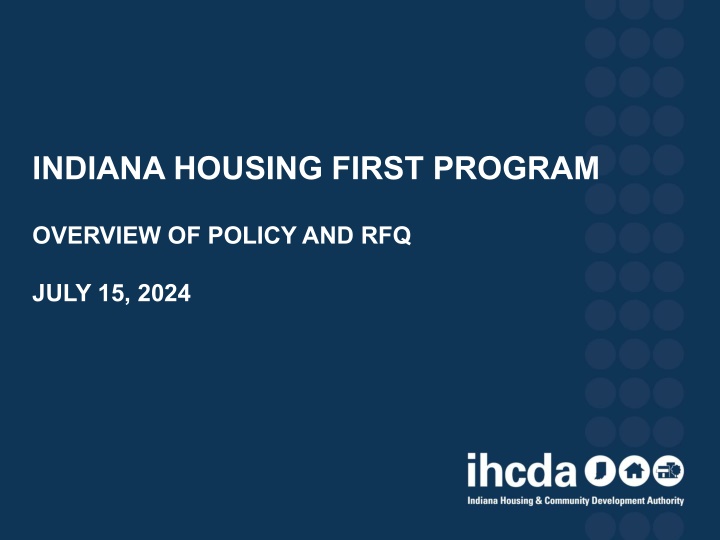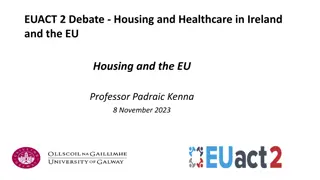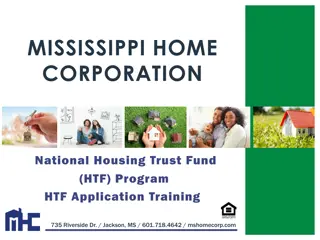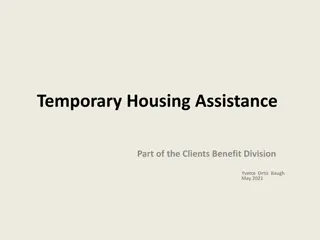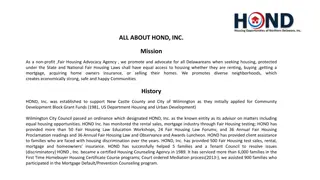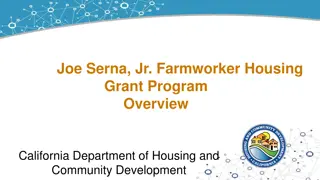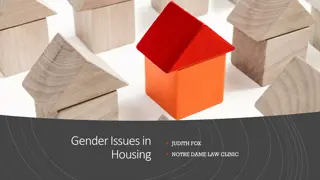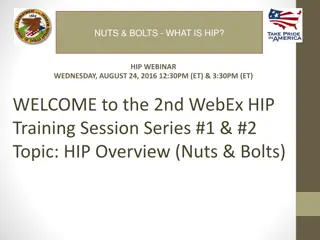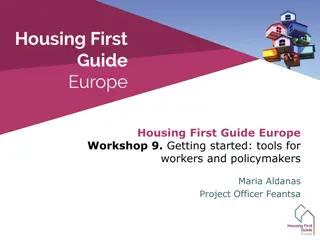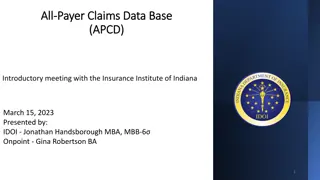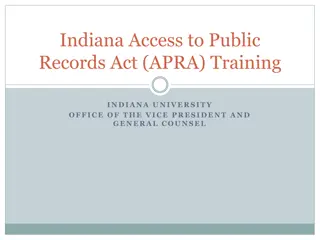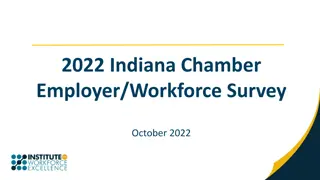Overview of Indiana Housing First Program Policy
The Indiana Housing First Program, initiated in 2017, offers rental assistance and supportive services to individuals and families with mental illness or addiction facing housing crises. Emphasizing a Housing First model, the program provides time-limited, person-centered support with low-barrier entry criteria. It follows a Critical Time Intervention approach to establish long-lasting stability through community networks.
Download Presentation

Please find below an Image/Link to download the presentation.
The content on the website is provided AS IS for your information and personal use only. It may not be sold, licensed, or shared on other websites without obtaining consent from the author.If you encounter any issues during the download, it is possible that the publisher has removed the file from their server.
You are allowed to download the files provided on this website for personal or commercial use, subject to the condition that they are used lawfully. All files are the property of their respective owners.
The content on the website is provided AS IS for your information and personal use only. It may not be sold, licensed, or shared on other websites without obtaining consent from the author.
E N D
Presentation Transcript
INDIANA HOUSING FIRST PROGRAM OVERVIEW OF POLICY AND RFQ JULY 15, 2024
Indiana Housing First Program POLICY MANUAL OVERVIEW
PURPOSE OF THE PROGRAM The Indiana Housing First Program ( the Program ) was created in 2017 by the state general assembly to provide rental assistance and supportive services to individuals and families with a serious, persistent mental illness, a chronic chemical addiction, or a serious and persistent mental illness with a co-occurring chronic chemical addiction, who are also facing a housing crisis. Program regulations may be found in Indiana Code 5-20-9
PROGRAM MODEL Housing First Person-centered approach, centered on the belief that all individuals are ready for housing and can achieve stability in housing with the right supports Services provided are voluntarily selected by participants are predicated on a harm reduction approach to addiction Services are available, but not required Harm reduction approach means that abstinence cannot be required If a household elects to receive services, the services must be individually tailored to the needs and goals of the household Assistance is time-limited with the goal of increasing self-sufficiency
PROGRAM MODEL Housing First Low-barrier entry criteria, with no additional barriers added by Program recipients. Participants may not be denied entry for: Having too little or no income Active or history of substance use Participants may not be terminated from the Program for: Failure to participate in supportive services Failure to make progress on a service plan Loss of income or failure to improve income Any activity not covered in the participant s lease agreement Participants must have typical lease, with all rights and responsibilities
PROGRAM STRATEGY Critical Time Intervention The program follows a Critical Time Intervention (CTI) approach to providing assistance Goal of CTI is to build long-lasting stability by developing a community support network tailored to the individual s needs The relationships built in the community are expected to outlast the financial assistance provided by the program Evidence based practice that has been demonstrated to be effective at providing support to individuals with serious mental illness during a transition from sheltered or unsheltered homelessness to permanent housing
PROGRAM STRATEGY CTI Case Managers typically have small caseloads of approximately 15 clients CTI is typically split into three phases, with each phase expected to last four months +
PROGRAM STRATEGY The CTI period is expected to last for 12 months (up to 24 months). If the client needs more intensive services or long term supports at the end of the CTI period, they may be eligible for an additional 12 months of rental assistance and supportive services to help them in the period of transition. Examples of long term supports include: Housing Choice Voucher or other ongoing rental assistance Permanent supportive housing Disability income to support rental costs Skilled nursing facility, group home, or other living situations In depth CTI training opportunities will be offered by IHCDA throughout the grant year and will be required for any agencies and staff that have not yet had CTI training
PROGRAM ACTIVITIES Program funds can be used for: Rental assistance (tenant-based) (min 60% of funds) Supportive services (max 30% of funds) Administrative costs (max 10% of funds) Participants do not have to be enrolled in supportive services to receive rental assistance and vice versa
PROGRAM ACTIVITIES RENTAL ASSISTANCE At least 60% of the overall grant amount must be used for rental payments and other eligible housing costs as defined below: Monthly rental payments and first and last month s rent if required by the owner Utilities which are included in the rent Up to three months of rental arrears and associated late fees if necessary to obtain or maintain permanent housing. (If paid, the arrearage must be considered when determining the total number of months of assistance that the household is eligible to receive.) Lot rent for mobile homes or RVs. Payments must be paid directly to a third-party on behalf of the household and must be paid one month at a time. Rental payments are limited to 24 months per household per episode of housing crisis.
PROGRAM ACTIVITIES RENTAL ASSISTANCE At least 60% of the overall grant amount must be used for rental payments and other eligible housing costs as defined below: Security deposits of up to the value of two months of rent. Up to three months of utility arrears if necessary for the household to obtain or maintain utilities in a unit for which they are receiving rental assistance. Utility deposits and ongoing utility payments (not to exceed the IHCDA published utility allowance for the county) for households receiving rental assistance. Application fees or background checks required by the property owner to obtain housing. One-time moving fees. Conducting National Standards for the Physical Inspection of Real Estate (NSPIRE) inspections and calculating participant income (may be considered either administrative or rental assistance costs at the recipient s discretion).
PROGRAM ACTIVITIES SUPPORTIVE SERVICES A maximum of 30% of the overall grant amount must be used for supportive services costs as defined below: Employment assistance and job training, Substance abuse and addiction treatment, Educational assistance, Life skills assistance., Treatment for, and the management of, mental and physical health problems. Developing individualized housing and service plans, Transportation assistance, Assessment of service needs, Legal services, Childcare assistance, Provide housing stability case management services, Costs of acquiring essential household items not to exceed $250 per household per term of assistance without written permission from IHCDA, and Developing plans, making referrals, or connecting to the types of services listed above (e.g., internet or phone services).
ELIGIBLE COSTS ADMINISTRATIVE COSTS A maximum of 10% of the overall grant amount may be used for administrative costs as defined below: Processing claims, Supervision of Program staff, Reporting, including IHCDA required program evaluation and HMIS costs, Conducting NSPIRE inspections, Housing search, Mediation with property owners and/or landlords, Determining participant eligibility, and IHCDA-approved training.
INELIGIBLE COSTS Mortgage assistance, utility payments for homeowners, other costs related to homeownership, Rent or utility assistance for households receiving other housing subsidy, Hotel/motel payments, Cable or satellite services, Monthly utility payments for households not receiving rental assistance, Renter s insurance not included in rent, Furniture and other household items with costs exceeding $250 per household per term of assistance without written permission from IHCDA, and Any other costs not listed in this document without specific written permission from IHCDA.
PARTICIPANT ELIGIBILITY An eligible participant in the program is defined as: An individual with a serious mental illness, a chronic chemical addiction, or a serious and persistent mental illness with a co-occurring chronic chemical addiction, resulting in a housing crisis (defined on next slide). Participants do not have to income qualify at initial enrollment and there is no maximum income limit. However, for a participant to receive more than 12 months of rental assistance, the participant s household income must be certified as having an annual income at or below 50% of the area median income (AMI) as published annually by HUD. A household with an income that exceeds 50% AMI may continue to receive supportive services only if they are otherwise eligible for the Program. Recipients may not establish a minimum income requirement for the Program and must accept households with little or no income.
PARTICIPANT ELIGIBILITY A Housing Crisis is defined as a situation in which an individual or a household does not have sufficient resources or support networks immediately available to maintain safe and affordable housing or to prevent the individual or household from requiring emergency housing. A household is determined to be in a housing crisis if they meet one of the following conditions: They are residing on the street or a place not meant for human habitation; They are residing in temporary housing, including emergency shelter, transitional housing, or are currently staying with family or friends on a temporary basis and must vacate within 2 weeks; They are facing an imminent court-ordered eviction. A household served under this definition is only eligible for a one-time arrears payment to prevent eviction and prevent homelessness, but can be served with ongoing services. They are exiting a residential treatment program within 30 days and do not have immediate access to permanent housing; They are living in an institution or other restrictive setting; and could, with stable and affordable housing provided by this program, along with community and home-based supports, live independently in the community.
PARTICIPANT SELECTION PLAN In addition to meeting the eligibility definitions above, recipients must prioritize serving eligible persons who are medically vulnerable and either immediately lacking housing resources or who must immediately exit a residential treatment program. As part of their request for funds, an applicant must define how it will prioritize medically vulnerable households. IHCDA will work with award recipients to finalize and approve their process for identifying and selecting Program participants.
PARAMETERS OF ASSISTANCE Eligible households may receive a maximum of 24 months of rental assistance per Housing Crisis. Households can receive services prior to housing and after housing ends, but households may not be enrolled in the program for more than 30 months in total. Participants receiving rental assistance must execute a lease with the property owner; initial lease terms must be renewable and for no less than 12 months. The contract rent charged by the landlord, plus a utility allowance if utilities are not included in the rent, must be determined to be reasonable. The participant s rent contribution must be at least 30% of the household s monthly adjusted income, with the goal of decreasing the subsidy over the term of assistance.
HOUSING QUALITY INSPECTIONS IHCDA will adopt the National Standards for the Physical Inspection of Real Estate (NSPIRE) quality standards and inspection protocol for the Program. All recipients will be required to conduct an NSPIRE inspection of the unit before allowing the beneficiary to move in. Recipients must utilize the NSPIRE HCV/PBV Inspection Checklist to determine whether the unit passes or fails NSPIRE Standards. Recipients may not perform NSPIRE inspections on units they own, or any unit for which the recipient has a financial interest.
MONTHLY REPORTS AND CLAIMS SUBMISSION Recipients must submit a monthly report identifying all households served through the Program each month. Funds will be disbursed on a reimbursement basis for eligible costs expended by the recipient. All claims will be made through IHCDA Online. Additional information about the claims process can be found in Section 9.2 of the Policy Manual. Budget Modifications are allowed. See Section 10.5 of the Policy Manual for details.
MONITORING AND COMPLIANCE HMIS The Homeless Management Information System ( HMIS ) is a secure, electronic data collection system used to determine the nature and extent of homelessness. Data regarding all individuals assisted with the Program s grant funds must be entered into either the Indiana Balance of State or the Indianapolis Homeless Management Information System (HMIS). IHCDA will determine the HMIS that the recipient must use based on the geographic location of the project. The recipient must submit all reports as requested by IHCDA. Additional reporting requirements will be communicated to selected respondents.
MONITORING AND COMPLIANCE TIMELY EXPENDITURE OF FUNDS All recipients of Housing First funds are expected to expend funds in a timely manner. Award agreements last 30 months. Target benchmarks for expenditures will be defined within the Award Agreement. Any recipient that fails to expend program funds in a timely manner may have those funds de-obligated by IHCDA. IHCDA reserves the right to reallocate unused funds from one recipient to another recipient or to add the funds to the total available award amount under the next Housing First RFQ.
Indiana Housing First Program RFQ OVERVIEW
RFQ TIMELINE July 1, 2024 July 15, 2024 July 31, 2024 RFQ released to the general public Informational webinar @ 2:00 p.m. Eastern Time (you are here) Respondent questions regarding RFQ must be submitted to Supportive Housing Analyst, Heather Pasku (hpasku@ihcda.in.gov) by end of day Responses due to IHCDA by 5:00 p.m. Eastern Time August 5, 2024 August 22, 2024 Announcement of selected Respondents teams at IHCDA Board of Directors Meeting Award term begins Award term ends On-going meetings with selected Respondents to provide technical assistance. If Respondent is selected pursuant to this RFQ it will be required to have an initial one-on-one meeting with IHCDA staff after Board approves the award and prior to it expending any program funds September 1, 2024 February 28, 2027 Ongoing
ELIGIBLE APPLICANTS Nonprofit corporations recognized under Section 501(c)(3) of the U.S. Internal Revenue Code, public housing agencies, or units of local government May sub-grant to, or enter a formal or informal relationship with, the following types of organizations: Nonprofit or faith-based organizations Units of local government School corporations and schools Businesses Public housing agencies Social service providers Mental health providers Hospitals Affordable housing developers and providers Law enforcement agencies and correctional facilities Organizations serving homeless veterans Organizations serving victims of domestic violence Universities Workforce development and job training agencies
SCOPE OF SERVICES May request an amount between $100,000 and $300,000 for a 30-month grant term. Must use 60% or more of funds for rental assistance and housing costs May use up to 30% of funds for supportive services Up to 10% of funds may be used for administration costs
SELECTION PROCESS Evaluation of all qualifications will be completed by a selection committee consisting of staff from IHCDA. Selection is at the sole discretion of the selection committee. Applications will be scored according to the points system described in Part 2 Section 5. Applications which fail the threshold review will not be scored. Past award performance, including history of complying with federal, state and local guidelines, meeting benchmarks and quality of work performed and services provided will be considered. Any entity currently suspended or debarred by or in default with IHCDA will be disqualified. Award recommendations will be taken to the August 22, 2024, IHCDA Board of Directors meeting for final approval.
MINIMUM REQUIREMENTS Threshold Criteria Not-for-Profit Status (not for profit corporation, housing authority, or local unit of government) Financial capacity to administer the program, including the provision of required documentation Complete compliant proposal addressing all required items Applications which fail to meet the minimum requirements/threshold review will not be scored.
SCORED CRITERIA Overall Experience of Respondent and Partners (20 points) Respondent s experience, as demonstrated by a narrative including the following information: Experience administering rental assistance Experiencing providing and/or collaborating to provide supportive services Experience addressing housing crises, particularly with the Housing First and Critical Time Intervention Models and the harm reduction approach Experiencing addressing mental health and/or addiction, particularly with the Housing First and Critical Time Intervention Models and the harm reduction approach If the Respondent has no experiencing addressing housing crises or mental health and/or addiction, please describe instead experience working with other vulnerable populations. Partners Experience, as demonstrated by: Qualifications and expected contributions of each additional partners, including examples of past collaboration between partners and lead applicant
SCORED CRITERIA Readiness to Proceed (20 points) Respondent s readiness to proceed, as demonstrated by a narrative including the following information: Justification of the need for this program in the proposed coverage area Description of the proposed pipeline for identifying and engaging partners and landlords Description of the proposed strategy for identifying program participants Proposed program timeline
SCORED CRITERIA Program Description (25 points) A description of the overall scope of the program, as demonstrated by a narrative including the following information: Geographic location(s) to be targeted. Number and structure of staff involved. Proposed participant selection plan, informed by the Program Administration Manual. Plans to engage with clients prior to housing (e.g., visiting clients in shelters or encampments) Plan for incorporating client feedback. Current Housing First recipients should reference steps already taken to this effect.
SCORED CRITERIA Service Delivery (25 points) A description of the service delivery plan, as demonstrated by a narrative including the following information: Case management ratios and staffing model, including supervisor to case management ratio. Description of transportation services, if applicable. Description of assistance in application for mainstream benefits, including SSI/SSDI (will you use the SOAR process?). Description of mental health treatment offered. Description of substance use treatment offered. Description of any additional services to be offered to program participants.
SCORED CRITERIA Description of Key Staff (5 points) Identification of key staff who will run the program, including: For each lead, a current resume and brief narrative explaining their selection for the role A current organizational chart Budget (5 points) Completion of the Housing First Program Budget Form, with an attached narrative describing any additional sources of funding, if applicable.
SCORED CRITERIA Past Award Performance (10 points) (Past Housing First recipients only) Respondents who were the subrecipients of Housing First awards in the past will be also be reviewed according to: History of meeting benchmarks and providing timely and quality reports Quality of work performed and services provided Full expenditure of funds Any entity currently suspended or debarred by or in default with IHCDA will be disqualified. Applicants are not required to submit documentation to attest to past award performance. IHCDA will review documentation submitted from previous awards to evaluate Respondent s past award performance where applicable.
SUBMISSION CHECKLIST Checklist of Submission Requirements: Qualifications Coversheet. Required template included in the RFQ packet. Certification of Company. Required template included in the RFQ packet. Not-for-Profit Status. Verification of 501(c)(3) status, if applicable. Financial Capacity. Financials for the lead applicant. Narratives addressing all applicable questions for the following sections: Experience of Respondent and Partners. Readiness to Proceed. Program Description. Service Delivery. Description of Key Staff. Key program staff identification, resumes, narratives, and organizational chart. Budget. A tentative budget, using the Housing First Program Budget Form.
SUBMISSION FORMAT AND DUE DATE Responses must be submitted via email. All documents must be submitted in PDF only. Heather Pasku Supportive Housing Analyst Indiana Housing and Community Development Authority 30 South Meridian, Suite 900 Indianapolis, IN 46204 hpasku@ihcda.in.gov The deadline for submission is Monday, August 5, 2024, at 5:00 PM Eastern Time. Applications that do not contain all the required forms/documents as listed in this RFQ may be determined ineligible for further consideration.
QUESTION & ANSWER Heather Pasku Supportive Housing Analyst hpasku@ihcda.in.gov Zach Gross Supportive Housing Manager ZaGross@ihcda.in.gov
